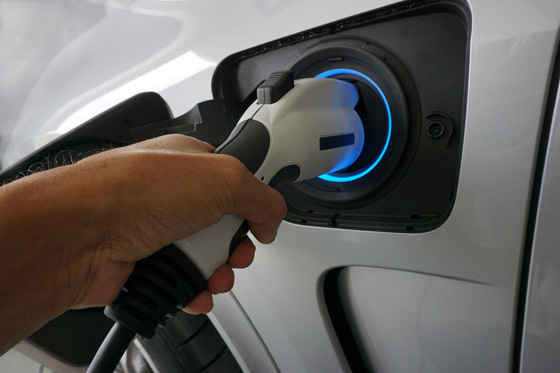
Grants of up to 21,450 euros for an electric car …
… not only in South Korea, where particulate matter and smog pollute the air they breathe. Norway stands out as being particularly well-disposed to electric cars. Ever since “dieselgate”, electric cars have been hailed as the new saviour of our environment. Ecovis, a consultancy firm focussing particularly on the interests of SMEs, turned to its international partner offices for answers to the question of what financial incentives to purchase e-cars or plug-in hybrids exist in their respective countries.
On roads the world over there are some 1.3 million vehicles powered by electric traction motors. Despite this, these “particulate preventers” are still not really catching on. To give the business a boost, over half of the 34 Ecovis countries participating in the survey offer financial incentives at the state’s expense. “With few exceptions, subsidies are offered not only for purely electric cars but for hybrids, too, irrespective of whether they are to be used privately or as company cars,” says Alexander Weigert, one of Ecovis’ directors. Only Bulgaria and China restrict their subsidies to vehicles purchased by private individuals. “In China, the incentive is paid directly to the manufacturer, which makes the selling price more attractive”, says Richard Hoffmann, a partner with Ecovis in Beijing. With impressive results: new registrations of e-cars in China increased from 1% p.a. in 2015 to 1.7% p.a. in 2016.
Europe’s Mecca for electromobility is currently in Norway. Roughly 15 percent of all newly registered cars are electric. Upto 2017 or possibly longer. buyers will not be required to pay purchase or value-added tax. The owners benefit from reduced car and road tax. They park for free, and they need neither to pay road tolls nor for ferries. In public parking spaces they can refuel for free. “Normally a Tesla S would cost 130,000 euros“, says Jørgen Svendgård from the Ecovis tax office in Oslo, “but here in Norway this Tesla would cost only 72,000 euros – so you can save 58.000 euros!“
With few exceptions, subsidies are offered not only for purely electric cars but for hybrids, too, irrespective of whether they are to be used privately or as company cars.
Financial incentives
As a general trend, subsidies for e-cars are significantly greater than for hybrids:
- South Korea heads the list, with buyers receiving a subsidy of the equivalent of 21,450 euros, which is made up of a national subsidy of 11,450 euros and a local bonus of up to 9,800 euros.
- In France the grant is 10,000 euros for e-cars but only 3,500 euros for plug-in hybrids.
- In Slovakia, the subsidy for e-cars is limited to the end of 2017, at 5,000 euros, and for hybrids at 3,000 euros.
- In Germany, Austria and Spain, the cash injection for first-time buyers of e-cars or hybrids is granted on condition that the list price or the actual cost of acquisition does not exceed a defined maximum limit. In Spain the subsidy depends on the car’s range: the greater it is, the more money can be expected from the state. In Germany the state and the car manufacturer each contribute 50% to the subsidy of 4,000 euros for e-cars and 3,000 euros for plug-in hybrids.
- In the Netherlands, business people purchasing an e-car are able to deduct up to 18,000 euros as additional depreciation, which is equivalent to a tax benefit of up to 9,360 euros.
- Lithuania offers cheaper parking (just a few euros per year) in the centre and old town of its capital, Vilnius. What is more, it still costs nothing at all to charge e-cars at power stations in Lithuania.
Taxation designed to curb prices
In some countries tax breaks are offered in addition to or instead of financial purchasing incentives:
- Turkey imposes a “special consumption tax” (SCT) on the net price of new vehicles in addition to 18% general sales tax on top of this. The SCT rate is between 45% and 160% for cars with combustion engines, depending on engine displacement and power, whilst for comparable e-cars it is only 10%.
- In Israel purchase tax, which can make up as much as 90% of the net price, depending on environmental impact, is reduced to 10% – 30% for e-cars.
- China imposes no taxes at all on e-cars and hybrid vehicles.
- Colombia and Russia offer exemption from import duties for purely e-cars, this being the only incentive, as does Hungary.
- In the Netherlands, e-cars are exempt from luxury and vehicle tax, and subsidies and accelerated depreciation options are offered for the provision of charging stations.
- In Hong Kong businesses can write off 100% of the acquisition price of e-cars in the first year.
- In Belgium a total of 120% can be written off over the span of the usual useful life.
In eight of the countries surveyed, there are no financial incentives whatsoever. These are Australia, Lithuania, Peru, Poland, Serbia, Czech Republic, Tunisia and Vietnam.
The results at a glance
| Financial incentives | no. of countries | % 1) |
| in total | 27 | 79% |
| Reduction of acquisition costs by | 202) | 59% |
| acquisition premiums (direct subsidies) | 12 | 35% |
| including company cars | 11 | 32% |
| exemption from import duties | 3 | 9% |
| reduction or elimination of purchasing taxes | 6 | 17% |
| other tax concessions3) | 21 | 61% |
| in addition to acquisition premiums | 7 | 21% |
| corporation tax: accelerated or higher depreciation of acquisition costs | 4 | 12% |
| income tax: purchase price partially deductible | 3 | 9% |
| income tax allowances for employees using a company vehicle privately, if it is an e-car or hybrid | 4 | 12% |
| motor vehicle tax exemption or deductions (for annual motor vehicle tax and/or registration duty) | 16 | 47% |
1)of the 34 countries participating in the survey
2)China (acquisition premium, no purchase tax) only paid out once
3)multiple answers possible
Contact us:
Alexander Weigert
ECOVIS Wirtschaftstreuhand GmbH Wirtschaftsprüfungsgesellschaft
Christoph-Rapparini-Bogen 2780639 Munich
Phone: +49 89 5898-2000
www.ecovis.com/muenchen


